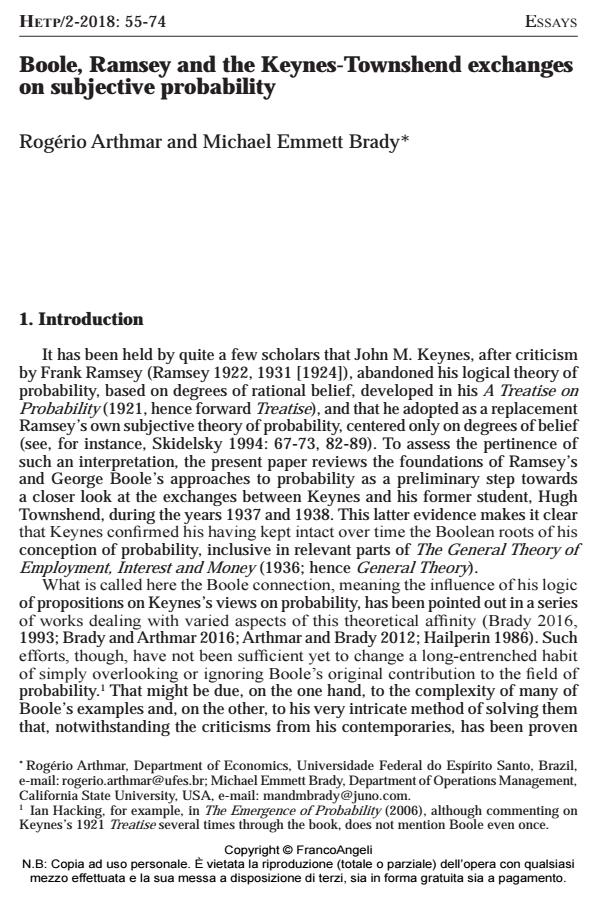Boole, Ramsey and the Keynes-Townshend exchanges on subjective probability
Journal title HISTORY OF ECONOMIC THOUGHT AND POLICY
Author/s Rogério Arthmar, Michael Emmett Brady
Publishing Year 2019 Issue 2018/2
Language English Pages 20 P. 55-74 File size 235 KB
DOI 10.3280/SPE2018-002003
DOI is like a bar code for intellectual property: to have more infomation
click here
Below, you can see the article first page
If you want to buy this article in PDF format, you can do it, following the instructions to buy download credits

FrancoAngeli is member of Publishers International Linking Association, Inc (PILA), a not-for-profit association which run the CrossRef service enabling links to and from online scholarly content.
Contrary to what is accepted in many quarters, John M. Keynes actually rejected Frank Ramsey’s subjective theory of probability, in general. He did accept, though, Ramsey’s betting quotient approach, but only in the special case where the weight of the evidence w equaled 1, so that all the probabilities were linear, additive, single number answers. In general, however, Keynes’s probabilities were indeterminate, that is, interval valued with the characteristic of being non-additive and nonlinear because the weight of evidence w was generally less than 1. The Boolean roots of Keynes’s approach to probability and his often-neglected exchanges with Hugh Townshend in 1937-38 provide strong evidence that Keynes never changed his mind on the subjective approach to probability. It is shown that, for Ramsey, the degree of belief is the confidence a decision maker has in the betting odds while, for Keynes, it is the degree of ‘rational’ or logical belief based on George Boole’s logic of propositions.
Keywords: Probability, risk, uncertainty, decision-making, weight of evidence
Jel codes: B13, B16, B31
- An Analysis of Keynes’s Straightforward, Easy to Follow, Alleged 'Infamous' Footnote 2 on pp. 55-56 of the General Theory - Is It Really that Difficult and Abominable? Michael Emmett Brady, in SSRN Electronic Journal /2010
DOI: 10.2139/ssrn.1681236 - Given Keynes's Definitions of Logical Probability and Evidential Weight, It Is Impossible for Keynes’s Approach to Measurement to Be an Ordinal Theory; His 'Non Numerical' Probabilities Must Be Based on Inexact and Imprecise Measurement Using Approximation Involving Boolean Upper and Lower Probability Bounds and Bounded Outcomes Michael Emmett Brady, in SSRN Electronic Journal /2019
DOI: 10.2139/ssrn.3335681 - A Very Short Note Covering the Five Easy Steps Needed to Show that Keynes’s Analysis in Footnote Two on Page 55 of the General Theory is Correct with a Minor Exception that Was Correctly Analyzed by Keynes in Footnote One on p. 283 of the General Theory in Chapter 20 Michael Emmett Brady, in SSRN Electronic Journal /2010
DOI: 10.2139/ssrn.1732251 - Keynes’s Aggregate Supply Function: Everything You Always Wanted to Know About Z Jochen Hartwig, in SSRN Electronic Journal /2011
DOI: 10.2139/ssrn.1855728 - Correcting Skidelsky's Fairy Tales About J M Keynes's Mathematical Capabilities and Exposition in the a Treatise on Probability, General Theory and After Michael Emmett Brady, in SSRN Electronic Journal /2016
DOI: 10.2139/ssrn.2890758 - How Keynes's Mathematical Analysis in Chapters 20 and 21 of the General Theory of His Elasticity Ew, Which Could Take on Any Values between ew =0 (Rigid, Given, Fixed, Constant, or Inflexible Money Wages) and ew =1 (Flexible Money Wages) Completely Destroys F. Modigliani's 1944 Econometrica Conclusion that Keynes's General Theory Category of Involuntary Unemployment Required Rigid Money Wages Michael Emmett Brady, in SSRN Electronic Journal /2018
DOI: 10.2139/ssrn.3166762 - A Refutation of the Paul Davidson and Post Keynesian Claim that Paul Samuelson Was Never a Keynesian Michael Emmett Brady, in SSRN Electronic Journal /2016
DOI: 10.2139/ssrn.2875039 - The Role of Ignorance About Keynes’s Inexact, Approximation Approach to Measurement in the A Treatise on Probability in the Keynes-Tinbergen Exchanges of 1938–1940 Michael Emmett Brady, in SSRN Electronic Journal /2019
DOI: 10.2139/ssrn.3353637 - The Mathematically Erroneous, Error Filled Post Keynesian 'D-Z' Model: Blaming J M Keynes for 60 Years of Post Keynesian Errors and Mistakes Michael Emmett Brady, in SSRN Electronic Journal /2013
DOI: 10.2139/ssrn.2318947 - Correcting Modigliani's 1944 'Liquidity Preference and the Theory of Interest and Money': This Article Dealt with Hicks's Interpretation of Keynes, but not with Keynes's General Theory Model Michael Emmett Brady, in SSRN Electronic Journal /2017
DOI: 10.2139/ssrn.2995316 - On L. Klein’s Erroneous Assessments of J M Keynes’s Views on Probability, Mathematics, and Statistics: Reviewing His 1951 Review of Harrod’s the Life of John Maynard Keynes Michael Emmett Brady, in SSRN Electronic Journal /2018
DOI: 10.2139/ssrn.3253471 - An Assessment of Nobel Laureate Robert Shiller’s Assessment of J M Keynes’s a Treatise on Probability and Its Connection to the General Theory: Correct in General, but Incorrect on Specifics Michael Emmett Brady, in SSRN Electronic Journal /2019
DOI: 10.2139/ssrn.3331008 - On Keynes’s Two Simplifications of His Aggregate Supply Curve Analysis in Chapter 21 of the General Theory: O. Lange (1938) Overlooked Chapter 20 and the Two Simplifications on Pages 295–296 of the General Theory in Chapter 21 Michael Emmett Brady, in SSRN Electronic Journal /2018
DOI: 10.2139/ssrn.3257209 - Keynes’s Method in the A Treatise on Probability and the General Theory Is Inexact Measurement Involving Approximation, Imprecise Probability, and Indeterminate Probability Using Boolean Interval Valued Probability: There Is no Explicit Theory of Ordinal Measurement Developed, Used or Deployed Anywhere in Either the A Treatise on Probability or the General Theory Michael Emmett Brady, in SSRN Electronic Journal /2019
DOI: 10.2139/ssrn.3340343
Rogério Arthmar, Michael Emmett Brady, Boole, Ramsey and the Keynes-Townshend exchanges on subjective probability in "HISTORY OF ECONOMIC THOUGHT AND POLICY" 2/2018, pp 55-74, DOI: 10.3280/SPE2018-002003